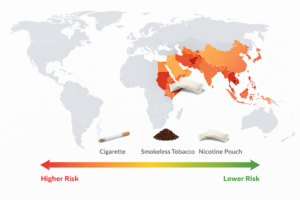The DiaSmokeFree Working Group send a letter to the American Diabetes Association (ADA) expressing concern and seeking correction of a couple of statements in the ADA guidelines regarding the use of e-cigarettes among individuals with diabetes.
The letter has been published today in Diabetes Care
Catania, 30 October 2023 – Smoking cessation in diabetes is largely neglected, and it is important to bolster confidence in diabetes education programs across the world to help health professionals maximize the chances of their patients stopping smoking or using tobacco. A pool of international diabetologists, denominated “DiasmokeFree Working Group” and coordinated by CoEHAR, addressed the issue of cigarette smoking among diabetes patients and sent to American Diabetes Association a letter to suggest a correction of the ADA guidelines regarding the use of e-cigarettes among patients with diabetes.
A specific part of the guidelines, which states “…in light of recent Centers for Disease Control and Prevention evidence of deaths related to e-cigarette use, no individuals should be advised to use e-cigarettes, either as a way to stop smoking tobacco or as a recreational drug,” is incorrect and inconsistent with the evidence presented by the Centers for Disease Control and Prevention, as well as several other reputable sources.
The DiaSmokeFree Working Group has also proposed the correction of the statement “no individuals should be advised to use e-cigarettes, either as a way to stop smoking tobacco or as a recreational drug” to “currently there is not enough evidence to recommend use of e-cigarettes as a tobacco cigarette substitute among people with diabetes who smoke, and more research needed.“
“The revision of this statement is crucial to accurately reflect the existing body of evidence regarding e-cigarette use among individuals with and without diabetes” emphasized Prof. Davide Campagna, CoEHAR member.
The DiaSmokeFree Working Group advocates for evidence-based practices in diabetes care and underscores the significance of aligning guidelines with current scientific research. They maintain that a nuanced and evidence-driven approach is imperative in providing accurate recommendations for individuals managing diabetes and smoking habits.
The ADA has been urged to consider the revision proposed by the DiaSmokeFree Working Group in their forthcoming guidelines to ensure accuracy and alignment with current research.
About DiaSmoke Working Group
This is a collaborative initiative dedicated to addressing smoking cessation methods and their implications for individuals managing diabetes. Comprising experts in the field, the group focuses on advocating evidence-based practices and guidelines in diabetes care. Members of the DiaSmokeFree Working Group include: Davide Campagna (University of Catania), Agostino Di Ciaula (University “Aldo Moro” Medical School, Bari), Tabinda Dugal (Royal Cornwall Hospital NHS Trust, Treliske, Truro, U.K.), Andre Kengne (Non-Communicable Diseases Research Unit, South African Medical Research Council and University of Cape Town), Anoop Misra (Diabetes Foundation [India], New Delhi, India); Riccardo Polosa (Center of Excellence for the Acceleration of HArm Reduction [CoEHAR], University of Catania); Syed Abbas Raza (Shaukat Khanum Cancer Hospital and Research Center, Peshawar, Pakistan), Cristina Russo (Ashford and Saint Peter’s Hospitals NHS Foundation Trust, Chertsey, U.K.), Roberta Sammut (University of Malta, Valletta, Malta), Noel Somasundaram (Endocrine Society of Sri Lanka, Colombo, Sri Lanka), and Magdalena Walicka (The National Institute of Medicine of the Ministry of Interior and Administration, Warsaw, Poland).




